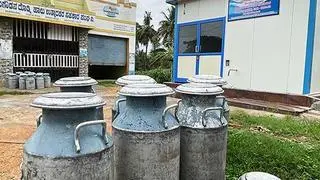Tamil Nadu is aiming to introduce suitable hybrid rice varieties in a big way to boost rice production in the State.
To accelerate hybrid rice production, the State machinery, through a Government sponsored scheme imparted hands-on training to around 100 farmers from Sathiyamangalam in Erode district in hybrid rice seed production.
The participants, according to Farm Varsity sources, were taken to seed production farms to get hands-on training in staggered sowing, planting methods, supplementary pollination and rouging. ‘Some experienced farmers shared their experience and encouraged fellow farmers to venture into hybrid rice seed production and earn extra income,’ the University source said.
Special Officer (seeds) M Bhaskaran said to achieve self sufficiency and meet the ever-increasing population needs, the annual production of rice in the country would have to be increased to 120 million tones by 2020.
(In its second advance estimate for the crop year (CY) 2012-13 (June-May), India’s Ministry of Agriculture expects the total rice production to reach around 101.8 million tonnes. This is said to be the second highest figure on record despite a delayed monsoon during the main cropping season last year.)
While emphasising the need for accelerating rice production in the State, Bhaskaran urged the programme participants to formulate commodity groups and market their brand of hybrid rice and reap rich returns.
The Professor and Head of the Department of Rice at the Tamil Nadu Agricultural University S Robin said that the area under hybrid rice was around 2 million hectares at present, but the Government was targeting to more than double the area to five million hectares in a span of five years
So far 59 hybrid rice varieties have been released in India, 31 of which are from the public sector and the rest from the private sector.
A study conducted across the State showed that Erode and Coimbatore were ideal pockets for production of hybrid rice seeds. ‘The success and sustenance of hybrid rice technology would depend on efficient and economical seed production. Increased seed yields in hybrid seed production would not only benefit the seed producers but also pave way for popularising the hybrid rice technology on a commercial scale. By careful manipulation, the yield can be increased considerably,’ said Robin.







Comments
Comments have to be in English, and in full sentences. They cannot be abusive or personal. Please abide by our community guidelines for posting your comments.
We have migrated to a new commenting platform. If you are already a registered user of TheHindu Businessline and logged in, you may continue to engage with our articles. If you do not have an account please register and login to post comments. Users can access their older comments by logging into their accounts on Vuukle.